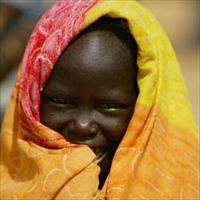NIGERIA: Stepping up the fight against child-trafficking

In a welcome centre in Nigeria’s capital, Abuja, a small finger traces the words of an English text book; a young voice struggles to pronounce the words. Ruth is 13 years old and only in grade 3. But for her, this is a major achievement.
At the age of five, Ruth was trafficked from her village in southern Nigeria to Gabon, further south on the Gulf of Guinea. For years of her life, she never attended school.
Taken by an uncle who promised to care for and educate her in Gabon, Ruth was instead required to cook, clean and take care of his children. Often deprived of food and sleep, she spent four years selling water at the market.
“Each time I brought the money and asked to go to school as he promised, he would tie a rope around my leg and beat me, beat me again and then lift me up and let me fall on the floor,” Ruth recounted, her small frame shivering from time to time.
Finally, in 2003, a family friend discreetly showed her the way to the Nigerian embassy. After investigation, she was returned to Nigeria but now lives at a welcome centre in Abuja. Both she and her mother, widowed and poor, thought that arrangement was in her best interests - to avoid being trafficked again.
Six million at risk?
Ruth is among six million Nigerian children estimated to be at risk of trafficking for domestic and forced labour, prostitution and pornography every year, according to a national survey conducted by the International Labour Organization in 2003.
The Nigerian government and non-governmental organisations are trying to fight the problem - through repatriation, awareness and prosecution.
Globally, child trafficking is one of the fastest growing organised crimes with an estimated 1.2 million victims per year, of whom 32 percent are African, according to the UN Children’s Fund (UNICEF).
In view of the clandestine nature of trafficking, accurate and reliable figures are hard to get. But with between 50 and 70 percent of the population living on less than a dollar a day in Nigeria, the phenomenon is widespread.
“Every state has a variant of child trafficking,” estimated Orakwue Arinze, spokesperson for NAPTIP, the National Agency for Prohibition of Traffic in Persons.
He said in the largely Muslim northern states, traffickers take children to Saudi Arabia. In the southern states, children are trafficked within the country or to neighbouring countries, he said.
Getting help
Sarah*, now nearly 15, was taken from her family at the age of eight and sent to Gabon. For three years, she was forced to work, selling items like cigarettes, kola nuts and liquor at a street corner.
“We were selling stuff from morning to night. We were not allowed to bathe or go to church or interact with people. Our hair was so dirty that we looked like mad people. Finally a friend reported us to the police,” Sarah remembers.
Sarah and Ruth both found shelter in Abuja at a house run by the Nigerian organisation WOTCLEF (Women Trafficking & Child Labour Eradication Foundation) and assisted by UNICEF. They live with 13 other children with similar stories, in the care of a matron. WOTCLEF also supports their education.
Fighting the trend
These children form part of the encouraging results of the work of NAPTIP, the government agency created in 2003 to help implement a then newly-created law prohibiting all forms of trafficking in persons. The crime is now punishable by up to 14 years in jail, the agency said.
Between 2004 and 2006, NAPTIP repatriated 757 child victims. In 2007 alone, 1,475 children (about 80 percent girls and 20 percent boys) were rescued, according to the UNICEF 2007 Annual Report. But despite these figures, all parties agree that more needs to be done, especially in the areas of awareness and prosecution.
“Children are gifts from God. Let’s protect them,” says a message in a new national awareness campaign UNICEF launched in October. Twice a day, clips explaining the dangers of trafficking are broadcast on public radio in English and Pidgin, the local English spoken widely across the country.
“We still need a lot of awareness creation to let people know that trafficking indeed is a criminal activity in Nigeria, because many Nigerians don’t even agree that it is criminal,” explained Veronica Kehen Umaru, coordinator of the WOTCLEF centre in Abuja. “A lot of people don’t accept that engaging little children in domestic work is criminal. I think it’s tied to our tradition of fostering. People don’t realise that this tradition is being abused.”
The prosecution of traffickers also remains a serious challenge, if not the biggest. While more victims are being rescued, according to NAPTIP’s Arinze, only 12 traffickers have been prosecuted in Nigeria since 2003.
“The victims are coming back but the problem is the network, the mafia in Europe. There is room for more collaboration between the European Union and Nigeria on these issues,” he said, recalling that Italy is the first destination in Europe for trafficked young girls working as prostitutes.
There have, however, been some high profile arrests in recent months.
Dutch police said at least 24 people were arrested in October for allegedly trafficking 140 Nigerian children to Europe, according to BBC News.
Burkina Faso, Benin, Cameroon, Ghana, Guinea, Mali and Togo are also among countries involved in human trafficking, UNICEF says.
(* not her real name)
 Back and Next - Back and Next
Back and Next - Back and Next See Also - See Also
See Also - See Also